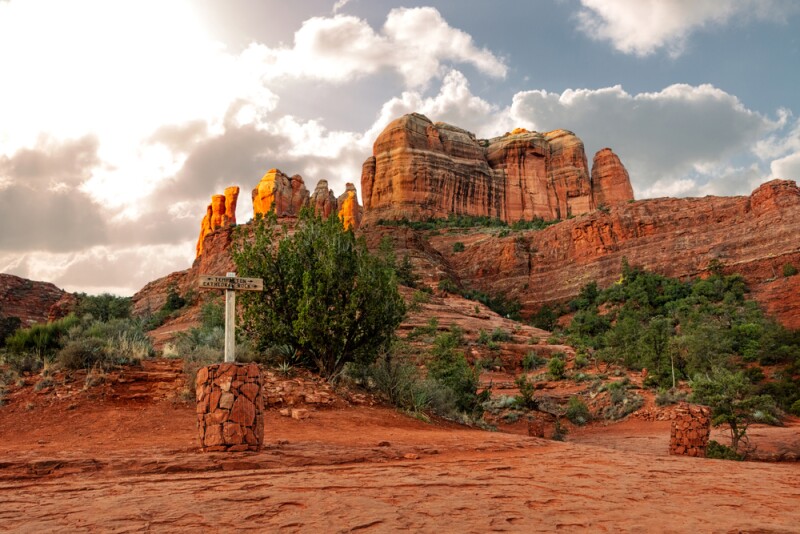Autumn is the Southwest’s mildest season, when summer’s intensity mellows into pleasant temperatures that are perfect for hiking, biking, and other active pursuits. The canyons’ cottonwoods and oaks produce bursts of yellows and golds that complement this area’s famously red rocks. And with thunderstorms diminishing in frequency after September, explorers typically enjoy long stretches of blue skies as they scale the region’s mesas and plumb its rock-lined canyons.
Here are a few of the Southwest’s signature fall adventures—and the best places to try them.
1. Crawl over slickrock
- Location: Moab, Utah
- Book a tour: Coyote Land Tours, $59 per person
Jeep drivers come from around the world to test their nerves (and vehicles) on Moab’s famously grippy slickrock. To enjoy the views while someone else does the driving, book a guided 4x4 trip with Coyote Land Tours. Its cadre of expert drivers carries passengers in a Mercedes-Benz Unimog fitted with massive tires that cling like Velcro to the fearsomely steep, ledgy slopes of Hell’s Revenge Trail, one of Moab’s most rugged—and scenic—4x4 trails. Gaze across a sea of fossilized sand dunes, learn about dinosaur remnants, and marvel at your vehicle’s ability to carry you across rock fins and pinnacles where most cars dare not go.
2. Hike Little Wild Horse Canyon
- Location: Goblin Valley, Utah
Fall’s tapering risk of flash flooding makes it the perfect season for hiking slot canyons such as Little Wild Horse, which tunnels through the sandstone near Utah’s Goblin Valley State Park. With a clear weather forecast, make this fun-house trek through twisted walls that are often so narrow that hikers must shimmy sideways to slide through the cracks. Water and wind have pockmarked the stone and formed striations that are endlessly photogenic. Admire them on a short, out-and-back hike of any length, or follow the canyon for 3.6 miles to turn left on a 4x4 road that connects to Bell Canyon (creating an 8-mile loop).

There’s more to Telluride than its ski season reputation.
Photo by Zach Betten/Shutterstock
3. Scale sheer cliffs
- Location: Telluride, Colorado
- Book a tour: Mountain Trip, from $185 per person
Cables, iron footholds, and ropes secure hikers as they complete Telluride’s Via Ferrata, a hiking and climbing route that skirts the cliffs above town. Mountain Trip provides both gear and guides and begins the five-hour adventure near the base of Bridal Veil Falls, the 365-foot waterfall that tumbles down the east wall of the box canyon surrounding Telluride. Rock isn’t the sole attraction: The valley’s aspens and cottonwoods turn yellow in September and October, creating vast bands of color that frame your views as you walk along cliffs and savor bird’s-eye panoramas across the valley.
4. Bike Zion Canyon
- Location: Zion National Park, Utah
- Cost: $35 vehicle entrance fee, nps.gov
Zion Canyon Road is closed to private vehicles from March through late November, when visitors use the park’s shuttles to access iconic viewpoints and trailheads located along the paved thoroughfare. But bicycling offers an open-air alternative to buses and lets visitors pause at will to snap photos of the soaring red sandstone cliffs flanking the road. Pedaling doesn’t require Ironman-level fitness: The pavement follows the Virgin River for eight miles on a nearly-flat grade linking the visitor center to the Temple of Sinawava, where chiseled sandstone towers rise nearly 3,000 feet above the water.
E-bikes make the trip even easier, and Zion Cycles in Springdale offers both motor-assisted and regular models to rent. Bring a lock to secure your bike while you hike to the Emerald Pools (1.2 to 3 miles round-trip, depending on destination) or Angel’s Landing (5.4 miles round-trip, permit required). You can also pedal among the cottonwoods lining the Virgin River, which blaze yellow in October and early November.

See fantastic display of reds, oranges, and yellows on the Templeton Trail hike.
Photo by GoodFocused/Shutterstock
5. Hike Templeton Trail
- Location: Oak Creek, Arizona
- Cost: $5 Red Rock Pass required to park at Bell Rock
This pleasant path winds among crimson buttes south of Sedona, Arizona—and these imposing pinnacles are mesmerizingly scenic in any season. But fall’s cooler temperatures kick off a riot of color along the canyons’ streams, where the oaks and cottonwoods lining the water display reds, oranges, and yellows. From the trailhead near Bell Rock, follow Templeton Trail for four miles (one way) as it bobs along Oak Creek and skirts the north end of Cathedral Rock to offer panoramic views of red towers and golden leaves.
6. Stargaze from Canyon Country
- Location: Chaco Culture National Historical Park, New Mexico
- Cost: $25 vehicle entrance fee, nps.gov
Without particles of humidity to amplify light pollution, dry, desert air makes for prime stargazing—and the ancient inhabitants of New Mexico’s Chaco Canyon determined this to be the Southwest’s best spot. Here, these expert astronomers built structures for viewing celestial objects, and the Park Service continues that tradition: An International Dark Sky Park since 2013, Chaco maintains a modern observatory and offers stargazing programs. Autumn’s cloudless skies offer ideal viewing, and in addition to star parties on weekend evenings, rangers host an Autumn Equinox program that lets visitors observe the alignment of Casa Rinconada (a ceremonial kiva) with the rising sun.







